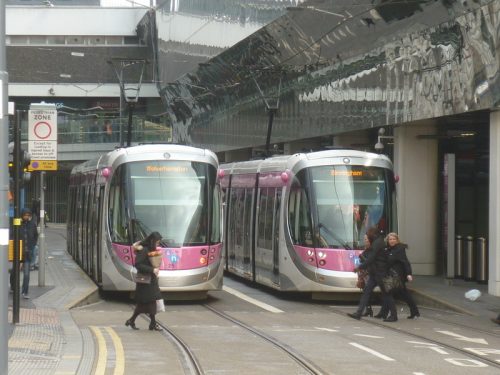Metro usage booms after extension through Birmingham city centre

The number of people using the Midland Metro soared to record levels last year following the tram system’s extension through the streets of Birmingham city centre.
Passenger figures jumped from five million in 2015 to 6.6 million in 2016 after trams returned to the city centre for the first time in more than 50 years, initially going to Bull Street and then to the redeveloped New Street station.
New figures show that taking the trams through the heart of the city’s shopping district to the station and its Grand Central retail complex has had a dramatic effect on the number of people riding the Metro, helping to generate a 32% increase on the network, which is now owned by the West Midlands Combined Authority (WMCA) and managed by its transport arm – Transport for West Midlands (TfWM).
The good news for whoever wins the May 4 West Midlands Mayoral election is that the latest forecast for the 12 months between the start of June last year, when the extension to New Street opened, and the end of May this year, shows the number of passengers is set to top seven million – up by more than two million on 2015.
The new Mayor will be responsible for the region’s transport network, therefore the Metro’s performance offers the winner an immediate gain and justifies the expansion of the service.
Cllr Roger Horton, lead member for rail and Metro on the WMCA’s Transport Delivery Committee, said the growth should be seen as an emphatic endorsement of the city centre extension, which cost almost £130m.
“This impressive increase shows why the WMCA is moving forward with a £1.2bn expansion of the tram network and why Metro is an important part of the authority’s economic and transport plans,” he said.
“These future tram extensions will be a catalyst for economic growth and jobs and will significantly improve people’s ability to travel between key destinations in the West Midlands, including the forthcoming HS2 stations.”
Colin Saward, managing director of National Express Midland Metro which operates the system on behalf of TfWM, added: “We are delighted to welcome these millions of extra customers on board.
“We brought in contactless payment when the Birmingham city centre extension opened – we thought it would make travelling by tram more attractive.
“We were proved right – now 20% of tickets sold on the tram are bought using contactless. Over two thirds of our customers tell us they like contactless because it’s quicker and they don’t need to carry cash or worry about having the right change.”
The tram network is expected to triple in size over the next decade as part of the WMCA’s long term transport strategy with passenger numbers forecast to grow to more than 30 million.
The expansion includes an extension of the route from New Street Station to Centenary Square, with services expected to start running in 2019.
Funding has also been earmarked for the line to go further along Broad Street, past Five Ways and on to Edgbaston by 2021.
A Transport and Works Act Order has also been submitted for an extension through Digbeth in Birmingham, running from Bull Street via Albert Street and on to the forthcoming HS2 high speed rail station at Curzon Street.
From there it would go along New Canal Street and Meriden Street into High Street Deritend, stopping at Digbeth Coach Station and the Custard Factory. It is anticipated the line could be open by 2023.
In Wolverhampton work is set to start on an extension through the city centre as part of the £51.8m Interchange project.
Meanwhile a business case is also being prepared to extend the Metro from Wednesbury to Brierley Hill.









